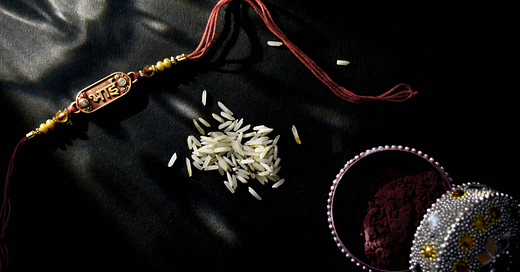Rituals are like little diyas that light up the road of our journey through life. They remind us to pause and enjoy milestones and celebrate our relationships.
In a country steeped in culture and tradition, we Indians have blessed ourselves with rituals around every corner at every waxing and waning of the moon. So much so that sometimes form takes precedence over substance and we lose sight of the deeper meaning of what we are celebrating.
Every year, the questions surrounding Rakshabandhan get shriller
Every year, as I prepare for Rakshabandhan, one of my favourite festivals of the year, I do so hounded with questions. I am fortunate to have a brother who is a friend, guide and drinking buddy all rolled into one. Every year, I hunt with a vengeance for the best rakhi for him, sometimes tying two, as no single one is good enough. Top that with being a parent to a girl and boy. As I watch the next generation take on this festival, my questions only grow bigger and more urgent.
Blessed as I am to be able to celebrate this bond for myself and my children, and tie rakhis as we will, I find the underlying premise of the ritual deeply troubling.
A festival that represents a sister’s love for her brother? Great!
The brother’s vow to protect her? No thank you.
For it presupposes two things, firstly that a sister needs protection and she is incapable of doing so herself, and secondly, that it is her brother’s duty to do so. Brothers don’t need protecting and sisters cannot possibly offer it.
Is this really 2024?
In a post-feminist world where we are talking about equal opportunity for men and women, pay parity, women in leadership roles, where we are talking about men who have the courage to be stay-at-home dads, who respect women, who don’t feel threatened by them, this aspect of the festival reeks of a regressive mind-set that believes that women are incapable of looking after themselves, let alone provide for the family or lead in organisations.
It reinforces what we have been told for years - that Sita Mata was defenceless against being abducted by Ravan and needed her husband to free her, that all Draupadi could think of doing, while she was being stripped in a royal court, was to close her eyes and pray for divine intervention from her rakhi bother, that Rani Karnavati had to send a rakhi to emperor Humayun to protect her from invasion from Bahadur Shah. Sure, there is Kali Ma, who slays evil forces, but isn’t she a rare exception, the lone star of a strong female role model in our constellation bursting with gods and goddesses?
Where violence against women has become a political act
What does the ritual really mean in a country where women doctors are being raped and murdered, where women are paraded naked as political acts? Not just here, even in the Western parts of the world, we need Barbie to remind us that a woman feels “ill at ease” as she navigates the real world?
Can’t we do better?
When rituals turn blatantly farcical, it might be time for a rethink. As we try to rise above patriarchy toward a more balanced society, our rituals need to rise as well.
Imagine then, Rakshabandhan being simply about celebrating love for our brothers and sisters, unencumbered from any need or promise of protection. Imagine girls walking around, their wrists sporting rakhis tied by their brothers. And if raksha must come into the equation, let both vow to protect each other from inequality, brothers and sisters alike, together, as the equals that we are.
This piece was first featured in Open Road Review and is currently available at Women’s Web: https://www.womensweb.in/author/nidhi-arora-3/#google_vignette





Hard relate Nidhi. Every year I tell myself that I will stop sending rakhis next year. Then the next year comes along and I rinse and repeat. Of all the festivals in our country - this is the one I used to love the most and have now grown to detest - because my family remains stuck, unable to see the farce that it is and unwilling to change the narrative. I loved your piece not only because you've said things that need saying but also because you offer the most wonderful solution - a new narrative :)